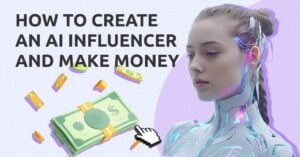
The Rise of AI Influencers: Transforming Social Media Marketing
In an era where social media is a cornerstone of marketing strategies, a fascinating phenomenon has emerged: AI influencers. These computer-generated avatars are designed to emulate human behavior and personality traits, finding their place on platforms such as Instagram and TikTok. Their rise introduces a paradigm shift, as brands now have the opportunity to engage audiences through characters they can control, often achieving followings and profitability that rival traditional human influencers.
AI influencers come equipped with curated personalities and physical traits intended to captivate audiences while offering many advantages. They exhibit emotional resilience and can effortlessly alter their appearances. Most intriguingly, they are free from the imperfections of human authenticity, making them an appealing option for brands pursuing cost-effective and reliable marketing solutions.
Creating these AI phenomena involves several stages. First, defining a specific niche and audience is crucial; identifying gaps in current influencer trends can result in a distinct content strategy. Next, sculpting a compelling persona with relatable backstories, values, and interests enables these virtual entities to forge connections with human users. Advanced AI technologies are utilized, including image generation and voice synthesis, ensuring the influencer’s identity remains consistent across various platforms.
Establishing a robust content strategy further reinforces the AI influencer’s market presence. This includes outlining the type of content to be posted, the frequency of interactions, and maintaining overall aesthetic coherence. Profile optimization is equally important; crafting an engaging social media profile aligned with the target audience encourages interaction and collaboration with other influencers in the space.
Ethical considerations also play a pivotal role in the sustainability and trustworthiness of AI influencers. Transparency regarding their AI-generated nature is vital to prevent misleading audiences. Continuous monitoring for ethical concerns ensures that these entities maintain integrity in their engagements.
As brands explore the monetization potential of AI influencers, multiple revenue streams surface. These include brand collaborations, subscription models for exclusive content, merchandise sales that reflect the influencers’ identities, and affiliate marketing programs that leverage their audience reach.
In conclusion, AI influencers embody the intersection of technology and innovative marketing, reshaping social media dynamics while offering unique opportunities for creators and brands alike. By leveraging the strategies outlined, aspiring developers can navigate this intriguing new landscape effectively.
Additionally, integrating the use of URL shorteners and link management tools, such as BitIgniter and LinksGPT, can further bolster the digital marketing strategies for AI influencers. These tools enhance tracking and engagement while efficiently managing the audience’s interaction with content. As the digital marketing landscape evolves, embracing such technologies becomes paramount for maximizing visibility and measurement of success.
#BitIgniter #LinksGPT #UrlExpander #UrlShortener #DigitalMarketing #AIInfluencers
Want to know more: https://influencermarketinghub.com/how-to-create-an-ai-influencer/

